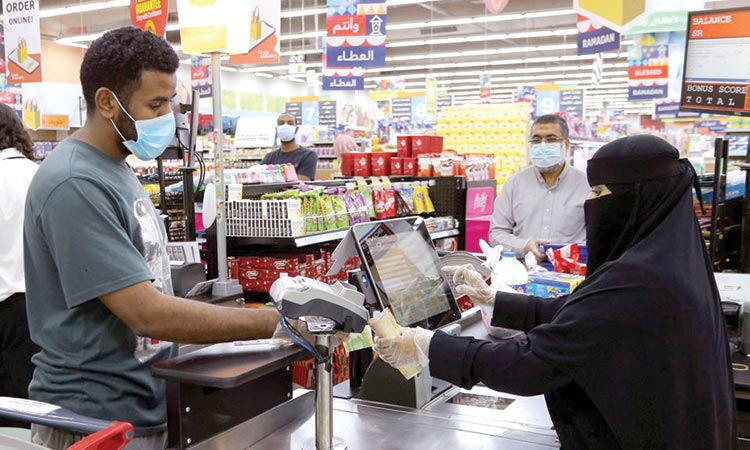Saudi Arabia’s business sentiment up as non-oil sector sees job growth

Picture used for illustrative purpose only.
Stronger labour market conditions underlined a faster increase in wages, adding to input cost pressures as purchase price inflation also accelerated. Nevertheless, companies reduced their selling charges for the second month in a row amid further reports that strong competition was eroding market share. The headline figure is the seasonally adjusted Riyad Bank Saudi Arabia Purchasing Managers’ Index (PMI). The PMI is a weighted average of the following five indices: New Orders (30%), Output (25%), Employment (20%), Suppliers’ Delivery Times (15%) and Stocks of Purchases (10%). For the PMI calculation the Suppliers’ Delivery Times Index is inverted so that it moves in a comparable direction to the other indices.
Naif Al-Ghaith PhD, Chief Economist at Riyad Bank, said: “In October, the Riyad Bank PMI surged to 58.4, indicating robust growth in the non-oil sector. This positive development was primarily driven by the significant rise in employment levels, reflecting increased hiring activity and a boost to the workforce. The employment expansion is a promising sign for the Saudi economy, as it suggests a growing demand for labour and a potential improvement in the job market.
“Another contributing factor to the expanded PMI was the strong growth in new orders, which reached the highest level since June. This indicates a renewed sense of confidence among businesses and a willingness to invest in new projects. The surge in new orders signifies an expanding market and suggests that the non-oil sector is experiencing sustained growth and demand for its products.
“Interestingly, despite facing higher costs, the selling prices of goods and services continued to decline. This decline can be attributed to intense competition within the market, as firms strive to maintain their market share by keeping prices competitive. While this may impact profit margins, it benefits consumers by providing them with more affordable products and contributing to overall price stability.
“Overall, the October PMI bodes well for the Saudi economy, suggesting that the non-oil sector is playing a significant role in driving growth which we expect to record above 6% for this year.
The headline PMI rose for the second consecutive month in October, picking up to 58.4 from 57.2 in September. The reading was the highest since June and indicative of a substantial upturn in the health of the Saudi Arabian non-oil private sector.
Business activity continued to grow at a marked rate at the start of the fourth quarter, in response to higher client orders and strengthening economic conditions. Companies also reported a sharp increase in new business intakes, with the rate of expansion improving to a four-month high. Growth in output and new business remained widespread across the manufacturing, construction, wholesale & retail and services sectors.
The latest survey data most notably indicated a steep uplift in hiring activity across the non-oil private sector. Surveyed businesses highlighted that strong demand and robust output expectations led to a need for greater staffing numbers. Subsequently, overall employment rose to the sharpest degree since October 2014.
Similarly, non-oil companies reported a faster expansion in purchasing activity in October, marking the first pick-up in the rate of growth for four months. The substantial uplift in input buying was mainly due to higher client orders, which also led to a sharp increase in stocks of purchases. Inventory growth was helped by a shortening of average input lead times, albeit one that was not as marked as in September.
Robust hiring meant that non-oil firms in Saudi Arabia were able to deplete their work-in-hand at the start of the fourth quarter. Moreover, backlog volumes decreased at the sharpest rate since August 2022. As well as greater staffing, firms mentioned that supportive government policies and subsequent improvements in the ease of doing business had helped them to reduce backlogs.
On the flip side, a heated labour market fuelled enhanced wage pressures in October. Combined with a faster increase in purchase prices, the pace of overall input cost inflation ticked up to the joint-fastest in over a year. Nonetheless, price discounting continued for the second straight month as firms highlighted competitive pressures, resulting in the strongest drop in output prices since May 2020.
Looking ahead, firms maintained a solid degree of confidence regarding future activity in October, with optimism often attributed to higher demand and robust order pipelines. The degree of optimism eased slightly, however.
Purchasing Managers’ Index (PMI) surveys are now available for over 40 countries and also for key regions including the eurozone. They are the most closely watched business surveys in the world, favoured by central banks, financial markets and business decision makers for their ability to provide up-to-date, accurate and often unique monthly indicators of economic trends.







